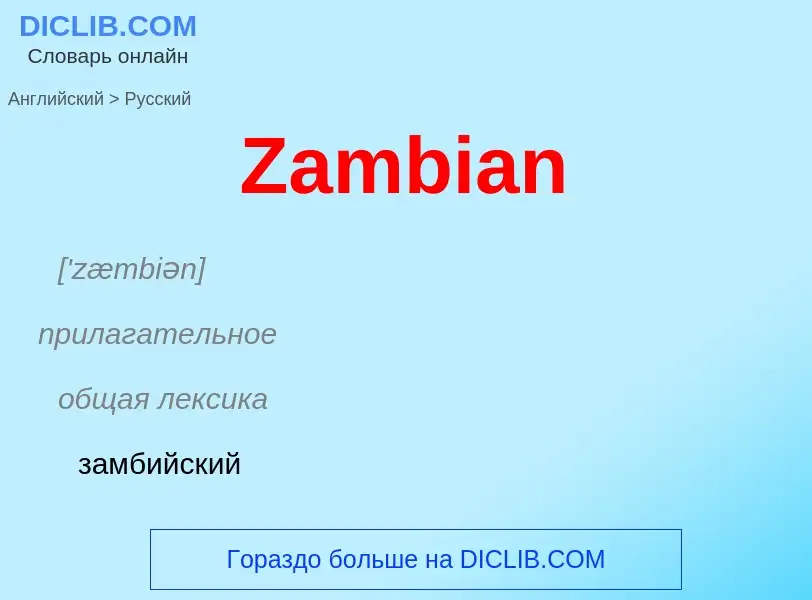Traduction et analyse de mots par intelligence artificielle ChatGPT
Sur cette page, vous pouvez obtenir une analyse détaillée d'un mot ou d'une phrase, réalisée à l'aide de la meilleure technologie d'intelligence artificielle à ce jour:
- comment le mot est utilisé
- fréquence d'utilisation
- il est utilisé plus souvent dans le discours oral ou écrit
- options de traduction de mots
- exemples d'utilisation (plusieurs phrases avec traduction)
- étymologie
Zambian - traduction vers russe
['zæmbiən]
прилагательное
общая лексика
замбийский
относящийся к Замбии
существительное
['zæmbiən]
общая лексика
замбиец
замбийка
житель или уроженец Замбии
['zæmbiə]
существительное
география
Замбия
Définition
Wikipédia
Zambia (), officially the Republic of Zambia, is a landlocked country at the crossroads of Central, Southern and East Africa, and is typically referred to as being in Southern Africa at its most central point. Its neighbours are the Democratic Republic of the Congo to the north, Tanzania to the northeast, Malawi to the east, Mozambique to the southeast, Zimbabwe and Botswana to the south, Namibia to the southwest, and Angola to the west. The capital city is Lusaka, located in the south-central part. The population of around 20.1 million (2023) is concentrated mainly around Lusaka in the south and the Copperbelt Province to the north, the core economic hubs of the country.
Originally inhabited by Khoisan peoples, the region was affected by the Bantu expansion of the 13th century. Following the arrival of European explorers in the 18th century, the British colonised the region into the British protectorates of Barotseland-North-Western Rhodesia and North-Eastern Rhodesia comprising 73 tribes, towards the end of the 19th century. These were merged in 1911 to form Northern Rhodesia. For most of the colonial period, Zambia was governed by an administration appointed from London with the advice of the British South Africa Company. On 24 October 1964, Zambia became independent of the United Kingdom and prime minister Kenneth Kaunda became the inaugural president. Kaunda's socialist United National Independence Party (UNIP) maintained power from 1964 until 1991. Kaunda cooperated with the United States in search of solutions to conflicts in Southern Rhodesia (Zimbabwe), Angola, and Namibia. From 1972 to 1991 Zambia was a one-party state with UNIP as the sole legal political party under the motto "One Zambia, One Nation" coined by Kaunda. Kaunda was succeeded by Frederick Chiluba of the social-democratic Movement for Multi-Party Democracy in 1991, beginning a period of government decentralisation.
Zambia contains minerals, wildlife, forestry, freshwater and arable land. In 2010, the World Bank named Zambia one of the world's fastest economically reformed countries.

![Yombe]] sculpture, 19th century Yombe]] sculpture, 19th century](https://commons.wikimedia.org/wiki/Special:FilePath/African Art, Yombe sculpture, Louvre.jpg?width=200)
![Batonga]] fisherwomen in Southern Zambia. Women have played and continue to play important roles in many African societies. Batonga]] fisherwomen in Southern Zambia. Women have played and continue to play important roles in many African societies.](https://commons.wikimedia.org/wiki/Special:FilePath/Batonga women.png?width=200)
![[[Victoria Falls]] [[Victoria Falls]]](https://commons.wikimedia.org/wiki/Special:FilePath/Cataratas Victoria, Zambia-Zimbabue, 2018-07-27, DD 05.jpg?width=200)
![An 1864 photograph of the Scottish explorer and missionary [[David Livingstone]] An 1864 photograph of the Scottish explorer and missionary [[David Livingstone]]](https://commons.wikimedia.org/wiki/Special:FilePath/David Livingstone -1.jpg?width=200)
, % of world average, 1960-2012; Zimbabwe, South Africa, Botswana, Zambia, Mozambique.png?width=200)
![Shona]] rulers of this kingdom dominated trade at Ingombe Ilede. Shona]] rulers of this kingdom dominated trade at Ingombe Ilede.](https://commons.wikimedia.org/wiki/Special:FilePath/Great-Zimbabwe-ruins-outer-walls-3-1200.jpg?width=200)
![[[National Heroes Stadium]] in [[Lusaka]] [[National Heroes Stadium]] in [[Lusaka]]](https://commons.wikimedia.org/wiki/Special:FilePath/Inauguration of Edgar Lungu.jpg?width=200)
![AChewa]] today descends from the kalonga of the Maravi Empire. AChewa]] today descends from the kalonga of the Maravi Empire.](https://commons.wikimedia.org/wiki/Special:FilePath/Kalonga.jpg?width=200)
![Inside the palace of the [[Litunga]], ruler of the Lozi. Due to the flooding on the Zambezi, the Litunga has two palaces one of which is on higher ground. The movement of Litunga to higher land is celebrated at the [[Kuomboka]] Ceremony. Inside the palace of the [[Litunga]], ruler of the Lozi. Due to the flooding on the Zambezi, the Litunga has two palaces one of which is on higher ground. The movement of Litunga to higher land is celebrated at the [[Kuomboka]] Ceremony.](https://commons.wikimedia.org/wiki/Special:FilePath/Litunga.jpg?width=200)
![Lunda]] houses by a Portuguese visitor. The size of the doorways relative to the building emphasizes the scale of the buildings. Lunda]] houses by a Portuguese visitor. The size of the doorways relative to the building emphasizes the scale of the buildings.](https://commons.wikimedia.org/wiki/Special:FilePath/Lunda houses-1854.jpg?width=200)
![Mwata Kazembe]], receiving Portuguese in the royal courtyard in the 1800s Mwata Kazembe]], receiving Portuguese in the royal courtyard in the 1800s](https://commons.wikimedia.org/wiki/Special:FilePath/Mwata.jpg?width=200)
![KwaZulu]] in South Africa. They eventually assimilated into the local ethnic groups. KwaZulu]] in South Africa. They eventually assimilated into the local ethnic groups.](https://commons.wikimedia.org/wiki/Special:FilePath/Ngoni Chiefs.jpg?width=200)

![Eastern Province]] Eastern Province]]](https://commons.wikimedia.org/wiki/Special:FilePath/Pupils at St Monicas Girls Secondary School.jpg?width=200)
![The geopolitical situation during the [[Rhodesian Bush War]] in 1965 – countries friendly to the nationalists are coloured orange. The geopolitical situation during the [[Rhodesian Bush War]] in 1965 – countries friendly to the nationalists are coloured orange.](https://commons.wikimedia.org/wiki/Special:FilePath/RhodesiaAllies1965.png?width=200)

![The [[Mwata Kazembe]] opens the Mutomboko ceremony. The [[Mwata Kazembe]] opens the Mutomboko ceremony.](https://commons.wikimedia.org/wiki/Special:FilePath/Umutomboko ceremony.jpg?width=200)
![The major Nkana open copper mine, [[Kitwe]] The major Nkana open copper mine, [[Kitwe]]](https://commons.wikimedia.org/wiki/Special:FilePath/ZM-Nkana-headgear-Kitwe.jpg?width=200)
![Romania]] in 1970 Romania]] in 1970](https://commons.wikimedia.org/wiki/Special:FilePath/Zambia123f.jpg?width=200)
.png?width=200)
![Zambia National Assembly building in [[Lusaka]] Zambia National Assembly building in [[Lusaka]]](https://commons.wikimedia.org/wiki/Special:FilePath/Zambia National Assembly Building.jpg?width=200)
